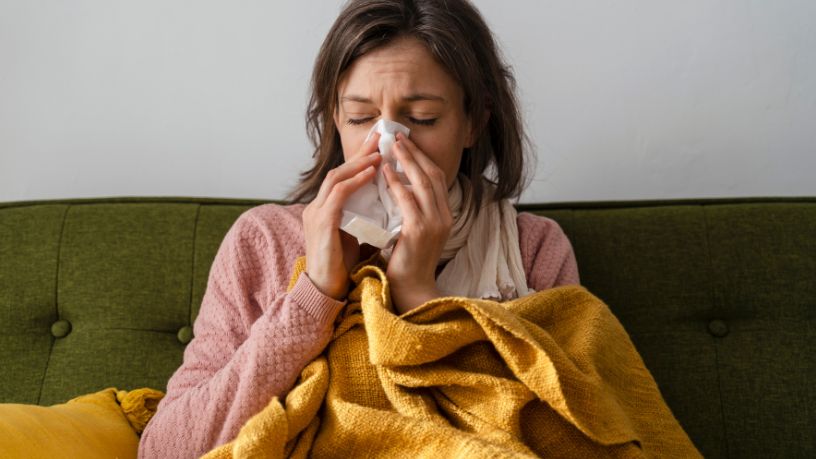The flu might be common, but it's a serious illness that can be life threatening.
On this page
Key takeaways
An annual flu vaccination reduces your risk of getting the flu and lowers the risk of complications if you do catch it.
Talk to your GP or pharmacist about how and when to get your annual flu shot.
Summer has ended and flu season has begun. It's time to stock up on tissues, get back into the habit of washing your hands regularly, and book your annual flu vaccination.
"Australians need to roll up their sleeves for the flu shot," says Bupa Medical Director Dr Tony MacDermott. "It will potentially save their life."
More than 365,000 cases of flu were reported in Australia in 2024, with 4,200 people admitted to hospital.1,2 According to Dr MacDermott, this year is on track to be even worse.
"[We've seen] twice as many flu cases already reported in Australia compared to the same time last year, with the flu season starting earlier than ever," says Dr MacDermott.
Find out how the flu vaccine works, when the best time is to book your jab, and how it can help protect your health this flu season.
What is the flu?
The flu (influenza) is a viral infection that's easily spread through coughing, sneezing and touching virus-infected surfaces. It's linked to 3,000 deaths in Australia every year,3 and can lead to serious complications in vulnerable groups like:
- people who are pregnant
- babies and children under 5 years
- people 65 years and older
- people with chronic health conditions.
Symptoms of the flu (such as a blocked or runny nose, fever, a sore throat and muscle aches) can last from a few days to a few weeks. People in at-risk groups may have symptoms for longer.4
You can be infectious before symptoms appear and for 10 days or more from the start of your illness.
What is the flu shot?
The flu vaccine strengthens your immune system so it can better fight the virus. It helps protect you from the flu and lowers your risk of developing a serious illness if you do catch it.5 It also helps protect those most at risk from complications (like pneumonia). According to Dr MacDermott:
Getting the flu vaccine is one of the simplest and most effective things you can do to protect yourself, your family, and your community.
While many factors affect how well the vaccine works in any given year, it's generally 30 to 60% effective in preventing the flu.6 Even if you've already had the flu this year, you'll still benefit from the vaccine as it may protect you against newer flu strains.
When should I get the flu shot?
According to Dr MacDermott, Australians should book their flu jab in April or May. This should give your body enough time to develop immunity before the flu season peaks in June and July.7
You need to get a flu shot every year because the flu virus mutates and creates new strains. Immunity from the most common strains usually lasts for 9 to 12 months, but it's strongest in the first 3 or 4 months after your vaccination.8
The latest flu vaccine is usually available in April, but this may vary from year to year. Ask your GP or pharmacist for more information.
Can the flu shot give you the flu?
You cannot get the flu from the flu shot. This is because flu vaccinations in Australia don't contain the live virus.5
Some people may experience flu-like symptoms after their shot, including fever, aches and pains, and tiredness. These symptoms are most likely your body's natural response to the vaccine and are usually mild and short-lasting. If symptoms persist, see your GP.
Who should get the flu vaccine?
Everyone in Australia aged 6 months and over should get the flu vaccine every year.
The flu vaccine is safe for pregnant people and unborn babies.6 Pregnant people who get vaccinated pass antibodies on to their baby, offering protection from the flu for the first 6 months after birth.9
How much does the flu shot cost?
Free flu shots are available every year for:8
- Aboriginal and Torres Strait Islander people aged 6 months and over
- babies and children from 6 months to under 5 years of age
- pregnant people (at any stage of pregnancy)
- people aged 65 years or over
- people aged 6 months or over who have medical conditions that mean they have a higher risk of getting serious disease.
Ask your GP or pharmacist about any fees you may have to pay for a flu shot.

At Bupa, trust is everything
Our health and wellbeing information is regularly reviewed and maintained by a team of healthcare experts, to ensure its relevancy and accuracy. Everyone's health journey is unique and health outcomes vary from person to person.
This content is not a replacement for personalised and specific medical, healthcare, or other professional advice. If you have concerns about your health, see your doctor or other health professional.
1National Notifiable Disease Surveillance System. (2025). National Notifiable Disease Surveillance Dashboard. Australian Government, Department of Health and Aged Care.
2Fernando, M. (2025). RACGP calls for action as flu cases reach record high. NewsGP.
3Hudson Institute of Medical Research. (2025). Influenza. Hudson Institute of Medical Research.
4NSW Health. (2024). Influenza fact sheet. NSW Government.
5Australian Government, Department of Health and Aged Care. (2025). Your questions answered. Australian Government.
6Australian Government, Department of Health. (2018). Influenza vaccine efficacy, effectiveness and impact explained. Australian Government.
7Healthdirect. (2024). Flu vaccine FAQs. Healthdirect.
8Australian Government, Department of Health and Aged Care. (2025). Influenza (flu) vaccine. Australian Government.
9Australian Government, Department of Health and Aged Care. (2025). Influenza vaccination in pregnancy. Australian Government.
You might also like...
The flu shot and pregnancy
The best way to protect yourself and your unborn baby from flu is to get vaccinated. We answer some common questions with the help of Dr Janice Tan.
The difference between a common cold and the flu
Colds and the flu can share a lot of the same symptoms, so we asked Dr Janice Tan how you can tell the difference and what you can do to reduce your risk.
Flu: Common symptoms and how to protect your health
The flu is highly contagious and more serious than a common cold. Find out how the flu works, the common symptoms and what you can do to reduce your risk.
Can the flu lead to pneumonia?
A bad case of flu can lead to complications, and one of the most concerning is pneumonia. Find out what pneumonia is, the symptoms, and how it’s treated.





